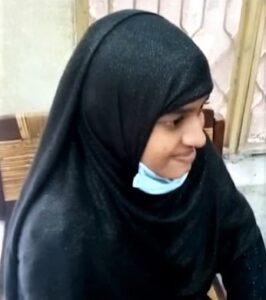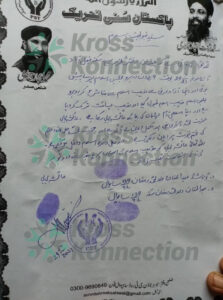- Court rejects plea of Christian man seeking custody of minor daughter allegedly forcibly converted, married to Muslim man
The Lahore High Court (LHC) has rejected a petition filed by a Christian man seeking the custody of his minor daughter who married a Muslim man, ruling that Islamic jurists regard mental capacity of a child as of crucial importance for conversion to Islam.
“There is no exact definition of religion. It is a matter of faith…,” observed Justice Tariq Nadeem while dismissing a petition filed by Gulzar Masih, a rickshaw driver from Faisalabad, whose 14-year-old daughter Chashman married Muhammad Usman after converting to Islam.
Masih had alleged that Chashman was abducted by Usman and his accomplices who forcibly converted her and married her with Usman.

He said the police found the girl but refused to hand over her custody to him saying she had converted to Islam and married Usman. Gulzar said he approached a local court in Faisalabad but it dismissed his application for the recovery of his daughter.
In his detailed verdict on the petition on which a short order was issued last week, Justice Nadeem observed that the Supreme Court has held that Article 20 of the Constitution grants rights to citizens to propagate their faith but that right does not allow anyone to convert a person to another religion by coercion or inducement.
Justice Nadeem maintained that forced conversion or imposing beliefs on others rather constitutes infringement of the right to freedom of religion.
ALSO READ: ICJ urges Pakistan to curb violations of religious freedom
The judge said that neither Holy Quran nor any specific hadith of Prophet Muhammad (PBUH) expressly stipulates minimum age for conversion to Islam. Justice Nadeem noted that Hazrat Ali (RA) was only 10 when he accepted Islam.
However, he stated that Muslim jurists regard mental capacity of a child as of crucial importance when considering the question of his/her conversion.
The judge remarked that the age of discernment is generally reckoned as the age when one attains puberty.
Justice Nadeem held that the high court cannot undertake a factual inquiry while exercising its jurisdiction under Article 199 of the Constitution as the question whether a conversion is tainted or otherwise cannot be determined without recording evidence.
The judge noted that the petitioner mentioned the age of his daughter as 17 years in the FIR [First Information Report] and it divulged from the record that she had contracted marriage with the respondent and also recorded her statement before a judicial magistrate under Section 164 of the Criminal Procedure Code.
The judge stated that the girl in her statement had said that she was sui juris and had embraced Islam of her own free will and without any coercion and no one had abducted her.
“In the eventuality of above discussion, the instant writ petition has no merit and is hereby dismissed in limine,” the verdict concluded.
CASE BACKGROUND
According to details of the case, Chashman, a grade six student, had gone missing from her school in Faisalabad on July 27. Her father, Gulzar Masih stated that the Samanabad Police Station registered an FIR No. 622/21 on July 28.
Gulzar said that when police retrieved the call data record of a SIM card in a smartphone his daughter was using for study purposes, it was revealed that Chashman had received a call from an unknown number on the day she had gone missing.
The next day the parents received images on the phone of an Islamic conversion letter, Islamic wedding certificate (Nikahnama) and an affidavit apparently signed by Chashman that she had willfully converted to Islam and married Muhammad Usman. The conversion and marriage was registered on July 29 in Sahiwal, the documents show.

According to the girl’s father, Chashman had turned 14 on May 13, 2021.

Child marriages are criminal under the Child Marriage Restraint laws. While Pakistani law recognizes intercourse with a girl below 16 years of age with or without her consent as rape punishable by death, courts have repeatedly held that marriage of an underage Muslim girl cannot be termed invalid because Islamic law holds that a consenting girl who has reached puberty can marry, human rights lawyers say.
On July 1, the Lahore High Court sent Nayab Gill, a 14-year-old child, with her alleged 30-year-old abductor. Both the trial court and the high court rejected her official birth documents and accepted her verbal claim in court that she’s over 18 years old.
Nayab’s parents have appealed to the Supreme Court of Pakistan with help from the Church of Pakistan for their daughter’s recovery.
MINISTRY REJECTS DRAFT ANTI-FORCED CONVERSION BILL
In a related development, the Federal Ministry of Religious Affairs and Interfaith Harmony on Thursday returned the draft of the Anti-Forced Conversion Bill to the Federal Ministry for Human Rights after raising objections on several clauses of the proposed legislation.
The Religious Affairs Ministry stated that it was opposed to the clauses related to the 18-year age bar on religion conversion, appearance before a judge, and a 90-day waiting period, saying these restrictions were anti-Islamic, illegal and violated the fundamental constitutional rights of an individual.
An official statement quoted Religious Affairs Minister Pir Noorul Haq Qadri as saying that the draft bill had been returned to the Human Rights Ministry after thorough consultations with religious scholars and the Council of Islamic Ideology (CII).
The minister stated that the draft bill in its current form was contrary to principles of the Islamic Sharia and basic human rights. He added that the bill could be used to discourage people from converting to Islam, and would create hatred between the Muslim and non-Muslim communities.
Qadri said that Islam prohibited forcible conversion and there was a need to discourage this practice. He claimed that incidents of forced conversion in Pakistan were few but they projected a bad image of the country.
On Aug 26, clerics belonging to all the four mainstream schools of thought had also rejected the draft bill, calling it a conspiracy and warning the government not to fall into the trap of the West by taking it to parliament.
The opinions were expressed by clerics belonging to the four mainstream Islamic schools of thought in the country – Shia, Barelvi, Deobandi and Ahle Hadis – in a meeting chaired by Religious Minister Qadri.
Incidentally, not only the clerics but even the government officials were unanimous in declaring that there was no forced conversion in the country and most of the cases related to “love affairs between individuals”.
Statistics, time and time again, denote the undeniable reality of forced conversions. Even though the government does not collect data on forced conversions, minority rights organisation Centre for Social Justice (CSJ) noted that around 162 questionable conversions had been reported in the media between 2013 and 2020 and abuses which had occurred in violation of religious freedom enshrined in Pakistan’s constitution of 1973.

